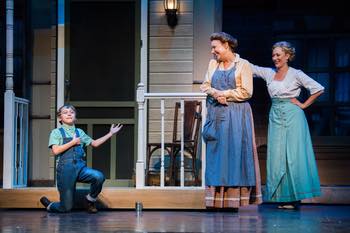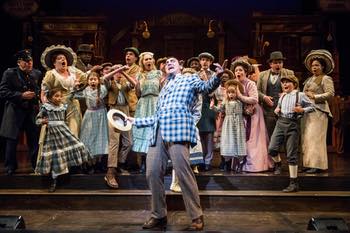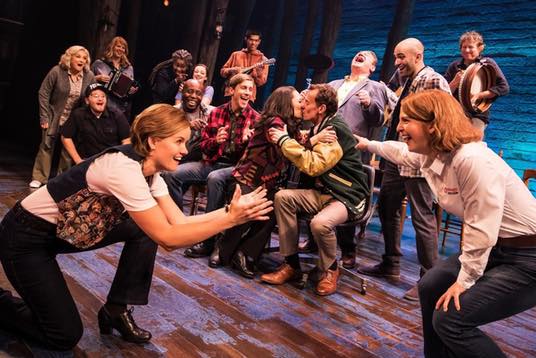THEATER REVIEW: “Julius Caesar” @ Great Lakes Theater by Laura Kennelly
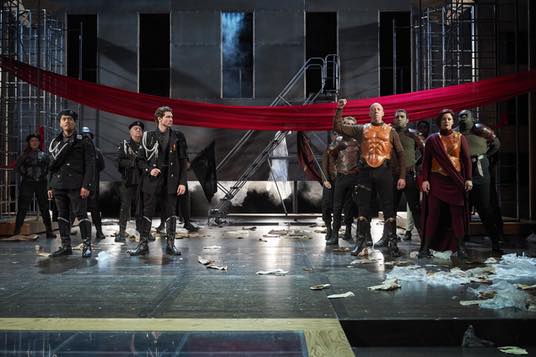
Through Sun 11/3
Sarah Bruner, director of Julius Caesar now at Great Lakes Theater, brings grim reality (and a bit of modernity) to Shakespeare’s classic tale about politics, changing rulers, and trusting sycophants.
Nothing good happens to Caesar.
The cuts were well-done (Shakespeare always must be cut unless it’s a mini-series), but the pace was so brisk that if one didn’t know the plot (but likely most do), one might wonder why the killers of Caesar turned on each other so quickly.
The night I was there, Shelby Griswold stepped in at the last minute as Caesar because regular player Carole Healey was unable to perform the role. Griswold’s Caesar proved as regal as they come and seemed quite comfortable as Rome’s possible dictator-in-waiting. When Caesar ignored the soothsayer (an eerie and creepy Jodi Dominick), as we knew he would, it was clear that pride blinded him.
The simple set by Russell Metheny employed scaffolding with a shaded second story where shadows and characters drifted past cutout windows. It was a practical solution that allowed us to imagine Rome’s close columns and public areas. Leah Piehl’s costumes seemed dark, as if togas were uniformly grubby. (Who knows? Maybe they were.) One iffy costume touch was the red ribbons that were pulled out as characters were stabbed. They were supposed to represent blood, but at times they turned bizarrely comic.
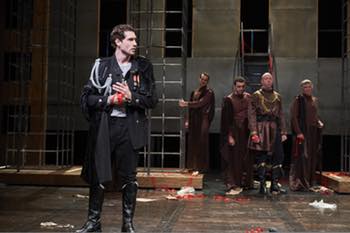
One unexpected highlight turned out to be when Caesar’s false friend Brutus (played as indecisive, yet forceful by Lynn Robert Berg) and his partner-in-crime Cassius (shown as facile and properly conniving by Laura Welsh Berg) disagreed about the need for murder and later how to cope with the fallout of the assassination. They seemed to echo mannerisms married couples (as the Bergs are) might recognize when Brutus and Cassius argued and when they agreed. It’s quite possible that close political allies might indeed have such a co-dependent relationship and the Bergs made that point.
As Mark Anthony, an engaging Nick Steen, barely disguised his character’s duplicitous nature. It’s amazing that Brutus and the others trusted him to speak at Caesar’s funeral. As Brutus’ wife Portia Jillian Kates shines, but briefly, since no one heeds her warnings.
The mob scenes provided a terrific demonstration of how easily crowds may be swayed by a good “spin.” Anyone who knows about social media knows how that works, but it was darkly amusing to see characters dashing about the stage as they turned quickly from one emotion to its opposite.
OK. Now to the elephant in the room. Gender-blind casting is not surprising anymore (is it?), and the actors in this Great Lakes production carried it off beautifully. What did seem patronizing and unnecessary was changing Shakespeare’s pronouns to fit the gender of the actor playing the character. At times it threw the rhythm of the speeches off. And it was inconsistent too — how could there be worry that Caesar wanted to be “King” as they said? Why wasn’t that changed to “Queen?” Let Shakespeare be Shakespeare and damn the consequences.

BOTTOM LINE: A well-acted timely and tidy summing up by an excellent Great Lakes cast of one of Shakespeare’s great tragedies.


